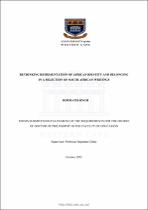Rethinking representation of African identity and belonging in a selection of south African writings
Abstract
In debates around Afrocentrism and decolonisation after the #rhodesmustfall student protests, as
well as in historicising the marginalisation of black writings in the South African literary
landscape, there is agreement on the urgency to shift African theoretical perspectives to the centre.
With the aim of contributing to these conversations, this thesis engages with African literary
thought as an attempt to disrupt the epistemological and ontological exclusion of black writings
and writers.
Deploying qualitative textual analysis, this study examines the representation of identity in Herbert
Dhlomo’s Writings (1935); Bloke Modisane’s Blame Me on History (1963); Oswald Mbuyiseni
Mtshali’s The Washerwoman (1971); Sipho Sepamla’s Words, Words, Words (1984); Mongane
Wally Serote’s To Every Birth Its Blood (1981); Lauretta Ngcobo’s And They Didn’t Die (1990);
and Phaswane Mpe’s Welcome to our Hillbrow (2001). This survey of black writings and literary
representation aligns with the history of colonial/apartheid resistance and key periods including:
the rise of Afrikanerdom in the 1930s; 1960s Sharpeville; 1970s Black Consciousness and Soweto;
the advent of democracy with Mandela in 1994; and the post-apartheid neo-liberal dilemma of the
black nationalist elite.

